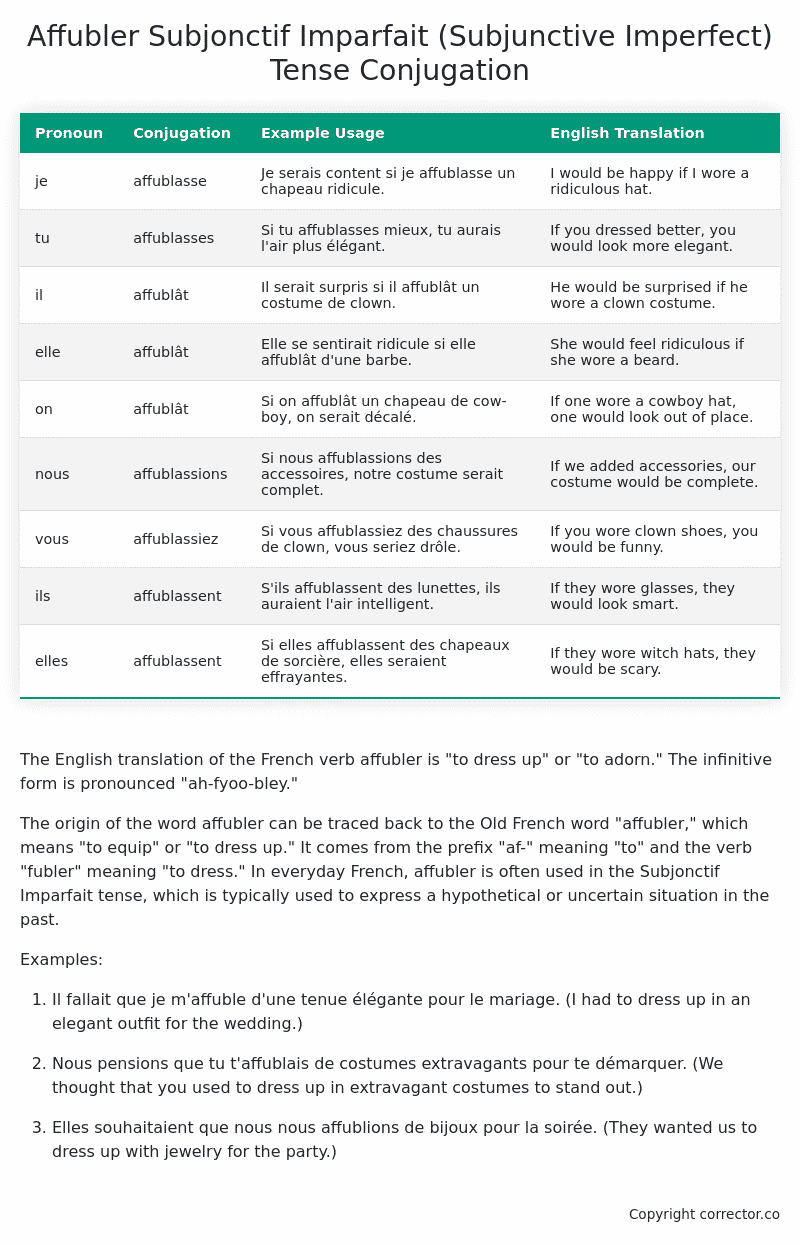Subjonctif Imparfait (Subjunctive Imperfect) Tense Conjugation of the French Verb affubler
Introduction to the verb affubler
The English translation of the French verb affubler is “to dress up” or “to adorn.” The infinitive form is pronounced “ah-fyoo-bley.”
The origin of the word affubler can be traced back to the Old French word “affubler,” which means “to equip” or “to dress up.” It comes from the prefix “af-” meaning “to” and the verb “fubler” meaning “to dress.” In everyday French, affubler is often used in the Subjonctif Imparfait tense, which is typically used to express a hypothetical or uncertain situation in the past.
Examples:
-
Il fallait que je m’affuble d’une tenue élégante pour le mariage. (I had to dress up in an elegant outfit for the wedding.)
-
Nous pensions que tu t’affublais de costumes extravagants pour te démarquer. (We thought that you used to dress up in extravagant costumes to stand out.)
-
Elles souhaitaient que nous nous affublions de bijoux pour la soirée. (They wanted us to dress up with jewelry for the party.)
Table of the Subjonctif Imparfait (Subjunctive Imperfect) Tense Conjugation of affubler
| Pronoun | Conjugation | Example Usage | English Translation |
|---|---|---|---|
| je | affublasse | Je serais content si je affublasse un chapeau ridicule. | I would be happy if I wore a ridiculous hat. |
| tu | affublasses | Si tu affublasses mieux, tu aurais l’air plus élégant. | If you dressed better, you would look more elegant. |
| il | affublât | Il serait surpris si il affublât un costume de clown. | He would be surprised if he wore a clown costume. |
| elle | affublât | Elle se sentirait ridicule si elle affublât d’une barbe. | She would feel ridiculous if she wore a beard. |
| on | affublât | Si on affublât un chapeau de cow-boy, on serait décalé. | If one wore a cowboy hat, one would look out of place. |
| nous | affublassions | Si nous affublassions des accessoires, notre costume serait complet. | If we added accessories, our costume would be complete. |
| vous | affublassiez | Si vous affublassiez des chaussures de clown, vous seriez drôle. | If you wore clown shoes, you would be funny. |
| ils | affublassent | S’ils affublassent des lunettes, ils auraient l’air intelligent. | If they wore glasses, they would look smart. |
| elles | affublassent | Si elles affublassent des chapeaux de sorcière, elles seraient effrayantes. | If they wore witch hats, they would be scary. |
Other Conjugations for Affubler.
Le Present (Present Tense) Conjugation of the French Verb affubler
Imparfait (Imperfect) Tense Conjugation of the French Verb affubler
Passé Simple (Simple Past) Tense Conjugation of the French Verb affubler
Passé Composé (Present Perfect) Tense Conjugation of the French Verb affubler
Futur Simple (Simple Future) Tense Conjugation of the French Verb affubler
Futur Proche (Near Future) Tense Conjugation of the French Verb affubler
Plus-que-parfait (Pluperfect) Tense Conjugation of the French Verb affubler
Passé Antérieur (Past Anterior) Tense Conjugation of the French Verb affubler
Futur Antérieur (Future Anterior) Tense Conjugation of the French Verb affubler
Subjonctif Présent (Subjunctive Present) Tense Conjugation of the French Verb affubler
Subjonctif Passé (Subjunctive Past) Tense Conjugation of the French Verb affubler
Subjonctif Imparfait (Subjunctive Imperfect) Tense Conjugation of the French Verb affubler (this article)
Subjonctif Plus-que-parfait (Subjunctive Pluperfect) Tense Conjugation of the French Verb affubler
Conditionnel Présent (Conditional Present) Tense Conjugation of the French Verb affubler
Conditionnel Passé (Conditional Past) Tense Conjugation of the French Verb affubler
L’impératif Présent (Imperative Present) Tense Conjugation of the French Verb affubler
L’infinitif Présent (Infinitive Present) Tense Conjugation of the French Verb affubler
Struggling with French verbs or the language in general? Why not use our free French Grammar Checker – no registration required!
Get a FREE Download Study Sheet of this Conjugation 🔥
Simply right click the image below, click “save image” and get your free reference for the affubler Subjonctif Imparfait tense conjugation!

Affubler – About the French Subjonctif Imparfait (Subjunctive Imperfect) Tense
Formation
Common Everyday Usage Patterns
Interactions with Other Tenses
Subjonctif Présent
Indicatif Passé Composé
Conditional
Conditional Perfect
Summary
I hope you enjoyed this article on the verb affubler. Still in a learning mood? Check out another TOTALLY random French verb conjugation!


